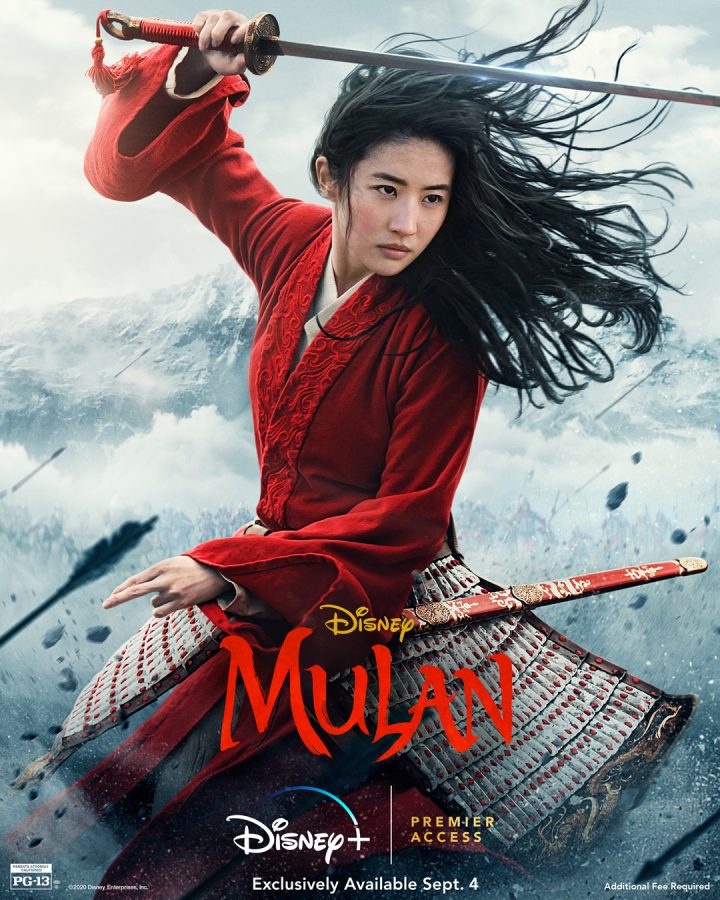Review: The new “Mulan” is courageously different
September 23, 2020
Editor’s Note: Despite the recent controversy surrounding “Mulan,” we are reviewing the film in terms of its artistic merit and are not factoring the controversy into our review score.
Disney’s “Mulan” has recently arrived for the second time, and it’s already overturning a lot of expectations. Directed by Niki Caro, the remake is anything but a live action duplicate of the original. It is a thorough reimagining of the story and its potential.
The story of Hua Mulan is the stuff of Chinese folklore, first appearing sometime between the 4th and 6th centuries A.D. Many of us in the modern world have become familiar with it through Disney’s animated adaptation, released in 1998. The live-action remake comes with some differences, but the nuts and bolts of the story are essentially the same.
Set in imperial China, the story follows Hua Mulan, played by Yifei Liu, a young woman with a fiery soul and a boundless spirit. She questions her role in a society that traditionally expects women to bring honor to their families through marriage. When the northwest region of China is invaded by Bori Khan and the Rouran army, the imperial army arrives in Mulan’s rural town recruiting soldiers, according to a decree by the Emperor requiring one man from every family.
Mulan’s father, Hua Zhou – a wounded warrior himself – is therefore forced to enlist, as he has no sons. Worried about her father’s frail condition, Mulan quietly decides to go in his place, stealing his sword and armor and disguising herself as a man. She proves to be one of the most capable soldiers in her battalion. Despite the knowledge that her deceit could label her a disgrace in the eyes of society and her family, she wholeheartedly sticks to what she believes to be her noblest endeavor.
The live-action setting of Caro’s “Mulan” seems to bring a renewed vitality to the story’s Chinese roots. It features the crisp, striking backdrops and scenery of some truly stunning shooting locations. Many of these shooting locations were in New Zealand, but easily pass for the sprawling, green-yet-frosted mountainscapes of northeastern China.
The film spares no color or detail in its costuming, sets, makeup and even its CG imagery. From start to finish, it draws and holds the audience’s attention with thrilling, eye-catching scenes – from a young Mulan scaling a rooftop while chasing a chicken, to a brilliant-hued phoenix sweeping across a canyon, to exciting, suspense-filled combat scenes. The film also incorporates a predominantly Chinese cast, at the center of which is Liu. Her skill on screen extends well beyond her acting ability to include an impressive amount of stunt work in the areas of martial arts, swordplay, combat and horseback riding. Liu performs roughly 90% of the stunt work required in the role, bringing to life a Mulan who is as fierce as she is beautiful.
For better or for worse, Caro has made quite a few bold choices that set the remake apart from its animated foremother. Aside from its departure from the classic musical format, the most noticeable and divisive is the omission of the graceless but loveable little dragon Mushu, voiced by Eddie Murphy, who serves as Mulan’s companion and protector. Despite the lack of musical numbers, there are references to the songs we know and love from the original, both in the score and in the dialogue. Omitting Mushu from the story was done in a movement toward strengthened cultural and historical accuracy, as were a number of other changes, including replacing the Huns with the Rouran Army.
I’ll be the first to admit that I was initially disappointed when I found out there would be no Mushu and no singing. It’s understandably difficult to let go of our expectations for remakes of movies that we have already come to love. However, the musical structure and snarky nonhuman sidekick – both hallmark elements in many of Disney’s animated classics – are not necessarily essential for a live-action movie that makes such good use of cinematography. This is all to say, once I became fully immersed in the action and beauty the film had to offer, I found myself enjoying it completely independently of any expectation I’d had going into it.
A new addition that truly adds value is the character Xianniang, played by Li Gong, a shapeshifting witch who serves as Bori Khan’s right-hand woman and infiltrates towns ahead of his army by transforming herself into a hawk. She is the only person who perceives that Hua Jun (Mulan’s male pseudonym) is actually a woman in disguise, and it is she who convinces Mulan to reveal her true identity, telling her, “Your deceit weakens you; it poisons your chi.” Xianniang tries to convince Mulan to join forces with her, and although Mulan refuses, it is clear that the two women have more in common than initially meets the eye.
Xianniang’s role in the story underpins the feminist themes at its core, in a most fascinating way. It explores more deeply the inner turmoil of a woman who finds herself torn between who she truly is and who society expects her to be. It also reshapes the revelation of Mulan’s gender and identity. Rather than occurring by accident, it is now a choice made by Mulan herself following a serious self-reckoning. In spite of their differences, Xianniang helps Mulan come to the realization that by hiding her identity, she hinders her own strength and spirit. This revelation conveys an important message: we cannot reach our full potential if we are not true to ourselves.
For viewers who have not yet seen “Mulan,” it is best to do so with an open mind and an open heart. Despite being a remake, the film yearns to be appreciated all on its own for what it is: a noble retelling of a beautiful story. In its own courageous way, it captures the spirit of the long-beloved heroine who honors her family as a warrior, rather than as a wife: brave, loyal, true.
To watch “Mulan” through Premiere Access on Disney+, click here.








